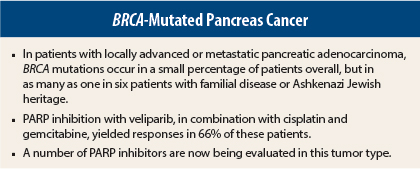Two-thirds of patients with advanced pancreatic adenocarcinoma who harbored BRCA mutations responded to the combination of veliparib, cisplatin, and gemcitabine in a phase IB trial that is paving the way for future studies of novel poly(ADP-ribose) polymerases (PARP) inhibitors in this challenging tumor type.
“BRCA-mutated [pancreatic adenocarcinoma] is a small but distinct subgroup seen mostly in Ashkenazi Jewish patients, those with familial [pancreatic adenocarcinoma], and patients with breast or ovarian cancer in the family. BRCA mutation may be a predictive biomarker for benefit to DNA-damaging drugs,” said Eileen M. O’Reilly, MD, Associate Director of Clinical Research at the Rubenstein Center for Pancreatic Cancer Research, Memorial Sloan Kettering Cancer Center, New York.
At the American Association for Cancer Research (AACR) Special Conference on Pancreatic Cancer held recently in New Orleans, Dr. O’Reilly described the potentially new therapeutic direction for this subgroup of patients.
BRCA in Pancreatic Cancer
BRCA mutations, especially BRCA2, convey an increased risk of developing pancreatic adenocarcinoma. Risk is estimated to be 2.2-fold in persons with BRCA1 mutations and 3.4- to 10-fold in those with BRCA2 mutations. While BRCA mutations are rare in the general population of patients with pancreatic adenocarcinoma—5% to 8%—their frequency rises to as high as 16% in patients of Ashkenazi Jewish heritage and perhaps to 19% in persons with familial pancreatic adenocarcinoma (ie, at least one first-degree relative with the disease).
PALB2, a partner and localizer to BRCA2 mutations, occurs in a smaller fraction (1%–3%) of cases of advanced pancreatic adenocarcinoma, but it is still important. The PALB2 protein stabilizes the BRCA2 protein and anchors it to the nucleus, allowing it to carry out its DNA repair function. More recently, PALB2 has been shown to associate with the BRCA1 protein as well, providing a linkage between BRCA1 and BRCA2 in homologous recombination repair of double-stranded DNA breaks.
DNA repair, however, can be compromised through PARP inhibition, and this might be harnessed therapeutically in pancreatic adenocarcinoma, Dr. O’Reilly said.
PARP inhibition leads to transformation of single-strand breaks into double-strand breaks that are cytotoxic in cells and renders them unable to be repaired through homologous repair. BRCA-deficient pancreatic cell lines are sensitive to cisplatin, mitomycin, and PARP inhibitors, and patients with BRCA mutations are sensitive to DNA-damaging agents, earlier studies have shown.
“This effect of synthetic lethality provides the therapeutic rationale for the development of PARP inhibitors for pancreatic adenocarcinoma associated with BRCA1 or BRCA2 mutations,” she said. “DNA damage control may be a novel target and a therapeutic opportunity.”
Study of Veliparib
Veliparib is a potent oral irreversible small molecule inhibitor of PARP 1 and 2. It is being evaluated in three non-randomized trials in combination with cisplatin-based therapy in previously treated and also untreated patients with known BRCA or PALB2 mutations, or a very strong personal or family history of pancreatic, breast, and ovarian cancer that suggests these mutations may be present.
Data have been analyzed for the phase IB lead-in dose-finalization study of this triplet combination, and Dr. O’Reilly presented the findings at the conference.1
Study Details
The study evaluated 17 patients with locally advanced or metastatic pancreatic adenocarcinoma, 9 of whom had a BRCA mutation and 10 who were BRCA wild-type. Four dose levels of veliparib were evaluated, in combination with cisplatin and gemcitabine.
“The triplet combination showed high activity in BRCA-related pancreatic adenocarcinoma,” Dr. O’Reilly said. “The majority of patients are still alive.”
In the BRCA-mutated subgroup, six patients responded, for an objective response rate of 66%, and three patients achieved stable disease, yielding a disease control rate exceeding 88%. Responses were observed in both BRCA1- and BRCA2-mutated patients.
“We saw a very high level of activity, with six partial responses, many of which were sustained and several are still ongoing,” she said. The duration on study for all but one of the responders was at least 9 months. The exception was a patient who was recently treated for breast cancer, which might have dampened her response to the regimen, the investigators believe.
In contrast, no significant activity was observed in non-BRCA-mutated patients. There were no responses, and the duration on treatment was less than 3 months.
Two dose-limiting toxicities were observed: neutropenia (65% grade 3/4) and thrombocytopenia (59% grade 3/4), mostly with 80 mg daily continuous dosing. “Otherwise, the drug was fairly well tolerated,” she said.
Future Directions
The first prospective randomized trial of this combination is underway in BRCA/PALB2-mutated patients with stage III/IV disease. The recommended phase II dose will be 80 mg veliparib twice daily on days 1 to 12 every 3 weeks, with fixed doses of cisplatin (25 mg/ m2) and gemcitabine (600 mg/ m2).
Other PARP inhibitor studies in pancreatic adenocarcinoma are evaluating olaparib, rucaparib, and BMN-673. In addition, a prospective registry of patients with BRCA-mutated pancreatic adenocarcinoma has been developed to better understand the molecular phenotype of BRCA-mutated disease vs several control cohorts. The registry is expected to provide insights into predisposing factors in high-risk persons.
The investigators also hope to gain insight into other issues, such as the mechanisms of response and resistance to PARP inhibition and platinum, through the correlative science program. ■
Disclosure: Dr. O’Reilly reported a financial relationship with Celgene.
Reference
1. O’Reilly EM: BRCA-mutated pancreas adenocarcinoma: Emerging therapeutic implications. AACR Special Conference on Pancreatic Cancer. Abstract IA28. Presented May 21, 2014.



